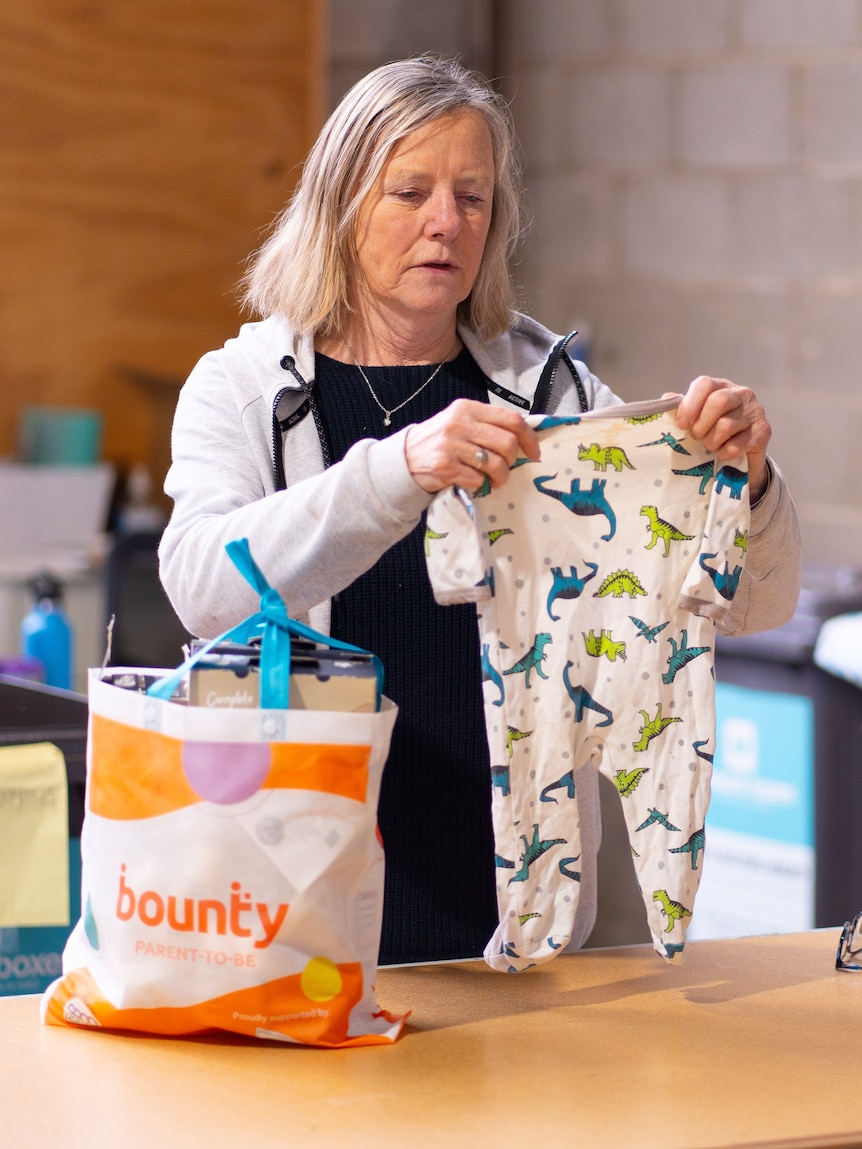Thousands of pregnant women in Australia are going hungry with half of those too scared to ask for help, according to new research.
The survey of more than 1,500 women found more than one in 10 expecting mothers had gone hungry while two in five were worrying about food, changing the quality of their diet and eating less.
Every single pregnant participant failed to meet all five pregnancy-specific nutritional guidelines.
Professor Danielle Gallego says expecting mothers are facing food insecurity. (ABC News: Marton Dobras)
Professor Danielle Gallegos – one of the authors of the study and a food security expert at the Queensland University of Technology (QUT) – said “all women were affected, even those on relatively high incomes”.
“We’re starting to see the impact of the cost of living crisis, mortgage stress, rental stress, across all incomes,” she said.
The researchers said the stark findings could be understating the full extent of the problem.
Since the survey began in August 2022, inflation has peaked at almost 8 per cent alongside 10 interest rate rises.
The authors said many of the risk-factors for household food insecurity were under-represented in the study.
“Our sample had a lot more women with higher levels of education and were mainly in the city areas,” Professor Gallegos said.
“So we suspect that it’s not just one in 10 pregnant women going hungry, but potentially a lot, lot worse than that.”
Treasure Boxes provide basic essentials to families and kids in need. (ABC News: Lincoln Rothall)
The findings did not surprise Treasure Boxes CEO Rikki Cooke, whose charity provides children’s essentials like cots and clothes to families in need.
“Compared to this time last year, we’ve had a 49 per cent increase in the number of families coming to us for support,” she said.
“These are families that have a mortgage, and possibly have two stable jobs.”
Too scared to ask for help
The survey asked a series of questions to find out participants’ level of food security, which is described as their financial access to adequate food.
It found half of the mothers who reported the lowest levels of food security had never accessed food relief programs or food banks.
“There’s a fear that if they access some of those services and acknowledge that they’re going hungry and their children might be going hungry, children in the household may be removed,” Professor Gallegos said.
Ask Izzy – an online search tool that anonymously connects users to social supports like foodbanks and shelters – saw over 300,000 searches for help in May, an increase of over 30 per cent over the past 12 months.
Rikki Cooke says more dual-income families are seeking help from their charity. (ABC News: Lincoln Rothall)
Ms Cooke said more can be done to help struggling families across Australia to access these services as most are “either too scared or don’t know how to access [them]”.
“So they just go without, and the innocent victims of that are children,” she said.
To make things easier for families, Treasure Boxes is allowing some families to access their services without being referred by a support agency or charity.
Adelaide charity Treasure Boxes provides child care items to struggling families. (ABC News: Lincoln Rothall)
“We saw the need was so great and families were feeling isolated,” she said.
“We’ve created a brand new program, the Family Support Program, where families can come directly to us.”
Looking overseas for answers
Professor Gallegos says Australia can learn from countries like the United States and United Kingdom, who have programs to support mothers who don’t have access to nutritious foods.
“Pregnant women in the US can access what they call the Women Infants and Children (WIC) program, which gives them access to nutritious foods,” she said.
It has been estimated the WIC program supported 39 per cent of infants in the US in 2023 at a cost of around $US1,000 per participant.
The study found about 10 per cent of expecting mothers are going hungry. (AP Photo: LM Otero, file)
A similar program in the UK provides food and supplements to expecting mothers.
“We have no equivalent programs in Australia,” Professor Gallegos said.
The QUT study suggests WIC could be a reason why pregnant women in the US, who live in low food security households, do not have a drop in the quality of their diet.
Some Australian families are too scared or don’t know how to access support. (ABC News: Lincoln Rothall)
Professor Gallegos said Australia can do better and suggested food be provided to mothers-in-need at their prenatal appointments.
“We need to do something to support pregnant women who eat a non-nutritious diet during pregnancy, because if we don’t the consequences are dire,” she said.
“Food in pregnancy is linked to low birth weights, poor outcomes for children and can even be linked to chronic disease in later life.
“If we don’t do something now we’re setting an entire generation up for poor health outcomes.”




